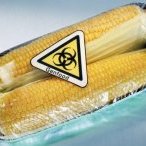English · Español

22 January 2014 | Interviews | Forests and biodiversity | Food Sovereignty
GM food labeling approved in Montevideo, Uruguay
Download: MP3 (1.7 Mb)
Mandatory labeling announcing the presence of genetically modified components has long been legally required in more than 60 countries, such as the European Union countries.
This is not the case in Uruguay, where in addition to suffering the strong influence in the food market of industrial chains that use these ingredients in their products, the territory itself and its biodiversity have suffered the impact of these GM monoculture crops (mainly soy and maize).
However, as a result of a awareness raising and interdisciplinary advocacy work including eco-gastronomic organizations, nutrition experts and environmentalists, among others, the local authorities of Montevideo passed a resolution in December 2013 to make this labeling mandatory.
Said organizations believe that the obligation to inform consumers through labeling is a right and a “first step” that can be continued with a declaration of a “territory free from GMOs”, and afterwards, the banning of these organisms at national level, both in animal feed and crop seeds as well. In fact, Uruguayan farmers can´t grow native varieties of maize since GM maize has taken over the market and its characteristics are not always explained.
The text, which is included in health and sanitation regulations of Montevideo (where over 50% of the Uruguayan population lives) establishes that “food that has been genetically modified or in which one or more of its genetically modified ingredients exceed 1% of the total ingredients, should bear a special label”. This doesn´t include non-packaged food products that are commercialized in restaurants, and it doesn´t apply to yeasts or other enzymes that may have been genetically modified.
Chef and member of Slow Food Uruguay, Laura Rosano, said in an interview with Real World Radio that the actual implementation of this resolution could take up to six months. Slow Food organized three seminars in the past years about the need for labeling and will participate in the drafting of the project. Their motivation started in 2010, when a study by the Sciences School of the University of the Republic concluded that all commercial brands of cornflour -often used to make “polenta”- contained GMOs.
Seminars, regional experiences, the approval of “new generation” GM organisms such as Monsanto´s “Intacta Soy”, and the evidence of increasing GM contamination in maize in different territories of the country, even those that were grown with the mandatory separation distance, motivated this interdisciplinary team to draft a labeling project as a way to start raising awareness on the problem and act accordingly.
The project was submitted to Parliament for approval at national level. However, its passing was limited to human food and it was only partly adopted by the government of Montevideo.
Rosano said that the organization will insist on the need to have a broader regulation that includes seeds, animal feed and areas free from GMOs.
Rosano also said that the labeling requirement is important because of its subsequent consequences: “by demanding, for instance, cornflour to be free from GMOs, we are opening the doors for farmers to promote another type of maize and to have areas where maize is protected since we know it can be contaminated with GM maize”.
“If we continue consuming this food without knowing it was genetically modified, we won´t demand another type of products”, she added.
Currently, more than 60 countries, including in the European Union, South Korea, Japan, Australia, India, China and Brazil have laws and regulations that require labeling of genetically modified food.
Until now, labeling was included in biosafety regulations in Uruguay, although as a voluntary option for the industry. Of course, no company chose to label their food with GM components.
Decree available (in Spanish) at Slow Food Uruguay.
Imagen: Foto: www.pajarorojo.info







